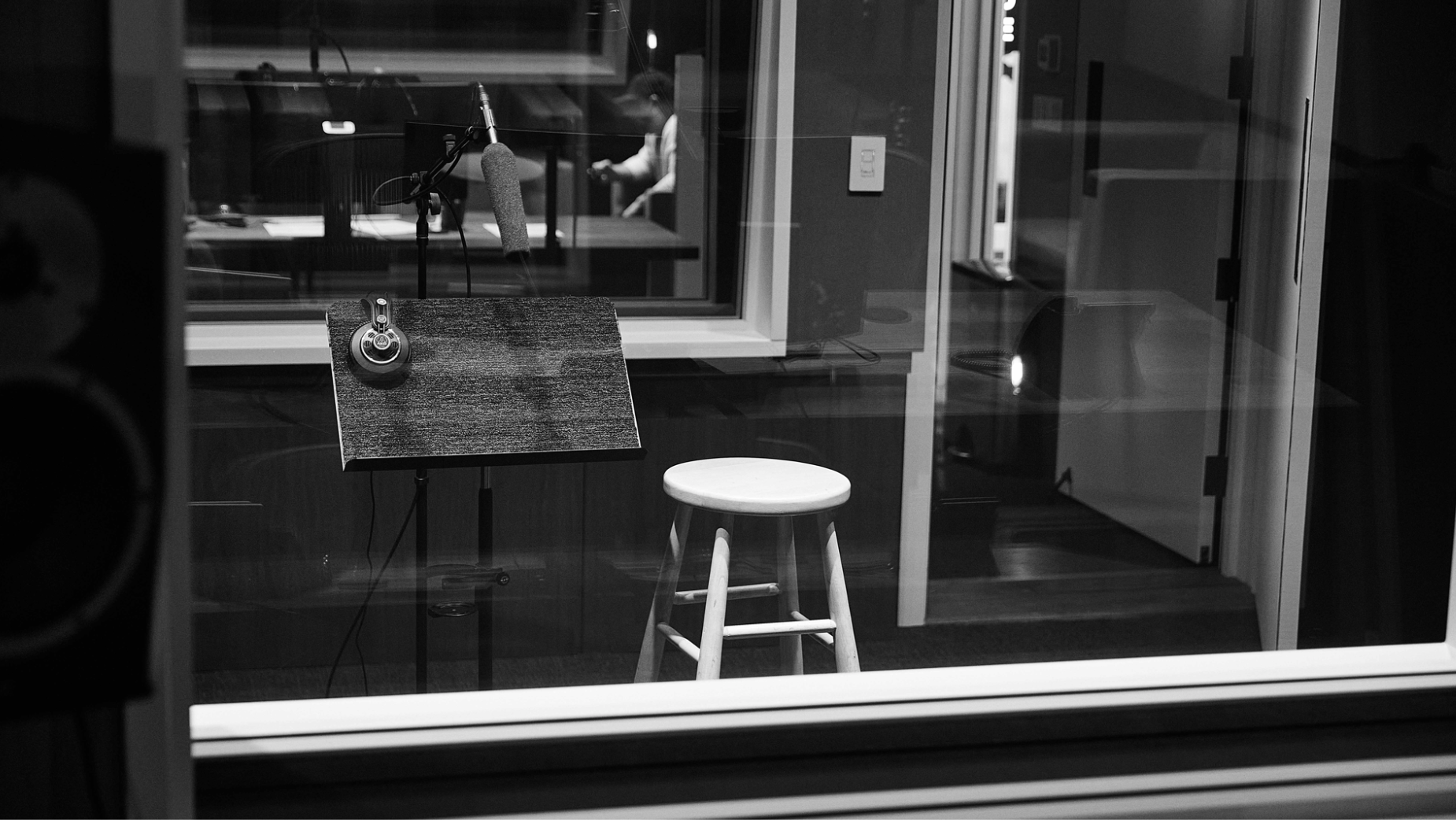
Thinking in Sound: Keeping Sessions Fun and Light with the Pirate Sound Team

Kyle Anderson (sound director, engineer): An ex-globetrotting, true-crime-loving, weekend Rockstar, Kyle has worked in post-audio for the last 12 years. When not directing and engineering, he can be found huddled by his electric fireplace snuggling his foster puppies.

Ian Boddy (sound director, engineer, composer): A shovel-your-neighbour's-walk-while-you're-at-it kind of guy, Ian has worked as a sound engineer, director, and composer for over a decade. When not in the studio, he can be found camping, fishing, and photographing his toddler's every move for posterity and or future embarrassment. He's nice, but he's not a saint.

Alex Nursall (sound director, casting): Alex, casting and voice director, was a self-professed uncool teen growing up, playing the bassoon, piano and bass. Now, as the co-creator/writer/director of the award-winning horror fiction podcast Parkdale Haunt, an avid hiker, and the third most tattooed person at Pirate Sound, we can all agree she is a very cool adult.

Keith Ohman (sound director, engineer): An introverted Swede with a taste for Aquavit, cooking, and melancholy music, Keith has been bringing his engineering and directing expertise to Pirate Sound for the past 25 years while heavily campaigning for a satellite office in Maui.

Jessi Petta (casting director): Jessi has worked in the commercial biz since the dawn of time, or at least that's how it feels to her, not that she's complaining. Who needs to complain when you let off steam boxing. A former member of the national Taekwondo team, Jessi got in the ring with Pirate Sound in its first year and has been in charge of casting ever since.

LBB> What are important elements in a casting brief that agencies and clients may not think about including but are super important to finding the “right” voice?
Ian> Have some good references - be it a celebrity voice or a spot you like etc., but know WHY you like it beyond just the tone, or the fact that they're well known. Find out what is appealing on an emotional level and try and tap into that as well.
Alex> Language around how we describe voice and how we describe the feeling of the spot itself can be really important. Understanding things like what words like “conversational” or “dry” or “gravitas” mean in the context of the spot is key. Honestly, I could talk for hours about this (please ask me to talk for hours about this).
Jessi> In one word, “words”. This is super important and knowing the meaning of the words you use in your casting brief (i.e., a voice with gravitas does not automatically mean a “deep voice”, it actually is a voice that can convey seriousness and importance when delivering your lines). Be clear & precise and don’t beat around the bush when writing a brief. Too little information could make us all guess at what you’re actually looking for (& therefore lead to avoidable mistakes). Too much information could be confusing and could be filled with contradictions, which can also lead to mistakes in casting.
LBB> Are you seeing a shift in demographics of the talent pool and/or in what people are looking for?
Ian> Thankfully we are starting to see a shift in demographics to include a more diverse representation of humanity. There's still a really long way to go, but the change is slowly starting.
Alex> There’s definitely a lot more diversity (across the board) both within what clients are looking for and within the talent pool (especially within the younger demographics) that I’ve been seeing even in the comparatively short time that I’ve been working in casting. It’s great to see.
LBB> How do you get the best performance out of a voice actor?
Ian> Trust them. At that moment you both exist as professionals hired for a specific task. To ignore or overlook the actor's instincts is a waste of invaluable input, experience and instinct. At the end of the day, it's a collaborative moment where the sum is greater that its parts.
Alex> Make the room comfortable (I usually start by making a very silly joke, thankfully no one’s rolled their eyes at me yet, although it would be totally warranted), I make sure that before we start that I’m very clear about what we’re looking for in the performance today, and I also give them space to try stuff out. If an actor has a thought about how they can maybe improve on their performance or try something new, I want to hear it.
Keith> First, I give the actor an overall direction for the spot the agency is looking for. Sort of a 30-thousand-foot view, but nothing too detailed. For the first take, I want to hear their interpretation of the script. They may do something that no one in the room thought of. Also, it gets them comfortable and builds trust between us because I want their input as well.
LBB> PIRATE SOUND is a full-service audio production house meaning they deliver audio services in three areas; sound design, music and voice talent. This requires a lot of interdisciplinary collaboration. How does sound direction and casting work together to meet a brief?
Kyle> Because it's the hub through which all auditions and demos pass through, our casting department is an incredible resource to have when zeroing in on who is best for the job. If I'm directing a more dynamic script or client is a still figuring out what they want exactly from their voiceover, our casting department has a wealth of knowledge when advising who has the range and experience necessary to deliver the types of performances we want to play with, ensuring that we're delivering takes of the highest calibre in session.
Ian> There's definitely a point in the process where the tone, pace and style of music needs to be considered against that of the voice and vice versa. Having discussions in the early stages across departments ensures that each element of the sound production is adding emotional value to the story being told.
Jessi> When you know the type of music clients are looking for, for their particular project it helps the director & talent themselves figure out what type of read would fit best for the spot.
LBB> How do you bring creativity into your role?
Kyle> I'd like to think that my beginnings in music and post audio have given me a solid foundation and unique perspective when it comes to sound direction for both voice and sound design. Having played drums for nearly 30 years It's become second nature to find rhythm and pacing in vocal performances and their union to music and sound effects. In the early years of my post-audio training, I was very much geared toward becoming a foley artist due to my appreciation for the subtleties and textures in movement of both objects and people, that bring not just life but personality to a scene. Good foley seeps into the subconscious of the viewer and allows for a more immersive experience. I feel that awareness of timing and appreciation for subtlety lets me get under the sonic skin of a mix or vocal performance and find the little things that just reach a little deeper.
Keith> I love to keep my sessions fun and light. I believe with a relaxed and open session the best ideas come to fruition. I feel that I'm here to help bring forward the agency's vision to the best of my ability. I always try to plus their creative though sound. Be it through emotion, surprising sound design or the best sounding mix I can do. I like to be on the cutting edge of technology and pull influences from all forms of art.















